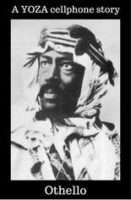Phindiswa can see that MamGcina is reluctant to say anything more for fear of hurting her. But she needs to know why her mother rejected her. She needs to know what happened to her mother when she went to Tat’uNqayi.
PHINDISWA: What happened then?
MAMGCINA: I took Nonkosi to Tat’uNqayi. He was a well-known ixhwele lase Hewu at Upper Didimana and I left her with him to perform the rituals needed to cleanse and protect her if she went to the city. When she came back to the village she was different.
PHINDISWA: How?
MAMGCINA: She was withdrawn. She didn’t laugh anymore and she kept her distance from me.
PHINDISWA: And Tat’uNqayi was to blame?
MAMGCINA: I think so … She was always a very open and bubbly person, but after coming back from that ixhwele I would hardly see her smile. I tried probing her for information but she would not speak. I then assumed that they made her work hard there and she was angry with me for having taken her there.
PHINDISWA: Maybe you should have asked her some more until she told you.
MAMGCINA: I tried, but each time I brought up the subject she would avoid it and talk about something else. Eventually she would not even sit where I was and preferred being in her bedroom.
PHINDISWA: Did she go to the city?
MAMGCINA: No … One evening I heard cries coming from the bedroom. I rushed in to find her on the floor. There was a lot of blood. I sent for the midwife but you arrived before the midwife got there. I had no idea that she was pregnant.
MamGcina shakes her head lost in thought.
NARRATOR: What MamGcina remembered she couldn’t tell Phindiswa – it would be too cruel. She had to protect her from that. She remembered the words Nonkosi said when she saw Phindiswa’s face for the first time, then turned away from her own daughter. ‘Yintoni le? What is this!’ she had said. She wouldn’t even hold her own child.
PHINDISWA: The inyanga is my father? That old man?
MAMGCINA: (nodding) Yes, my child. Your mother wasn’t well after you were born. I tried to stop her, but she left for the city. So I took care of you. But I was getting old and couldn’t look after you properly. That’s when I sent you to your cousins, the Mbazos.
PHINDISWA: And later they sent me to Cape Town.
MAMGCINA: Yes, they had found your mother and they thought …
PHINDISWA: That she would want me?
MAMGCINA: Well, she had got a job and she had had two boys from another man. That man had left her but she loved those boys.
PHINDISWA: But not me. She didn’t love me. Did you know she tried to marry me to an old man who had an eye for me. That’s why I ran back to you. Tell me, what happened to Tat’uNqayi, my father? Where is he now?
MAMGCINA: Long dead. I’m sorry, child. And I’m sorry that I might have been the cause of your unhappiness as well as your mother’s.
PHINDISWA: Don’t worry, Ma, at least you’ve told me what I needed to know.
MAMGCINA: I regret having sent her to that ixhwele. I’m sorry, child.
One of the mourners comes over to them and helps MamGcina back to the taxi that is waiting at the edge of the cemetery. Phindiswa gets up and stands over her mother’s grave and scatters more earth into the grave, talking out loud to her.
PHINDISWA: Mama, at least I know the truth now. I was as invisible to you on the day you died as the day I was born. Tat’uNqayi raped you, Ma. Why didn’t you tell MamGcina? Is that why you abandoned me? Ma, MamGcina told me that Tat’uNqayi has long walked in the valley of death. Now that you have joined him there, tell him what both of you did to me. And when you see your mother there in the valley of death tell her that you lived her life too; that you’re no different from her. But be sure to tell her that I am different from both of you. I love my daughter, even though I don’t know her father, and I will always love her and hold her close. Tell them that your stories have taught me to love and not abandon my own flesh and blood. I am glad that I have managed to learn the good out of all your situations: I have learned to overcome the bad and not repeat the cycle – no matter what happens, through thick and thin I will always be there for my daughter. I have forgiven you, Mama, and tell Tat’uNkqayi that I have forgiven him too. May you all rest in peace for I have found my peace today.
Tell us: did you enjoy this play?







